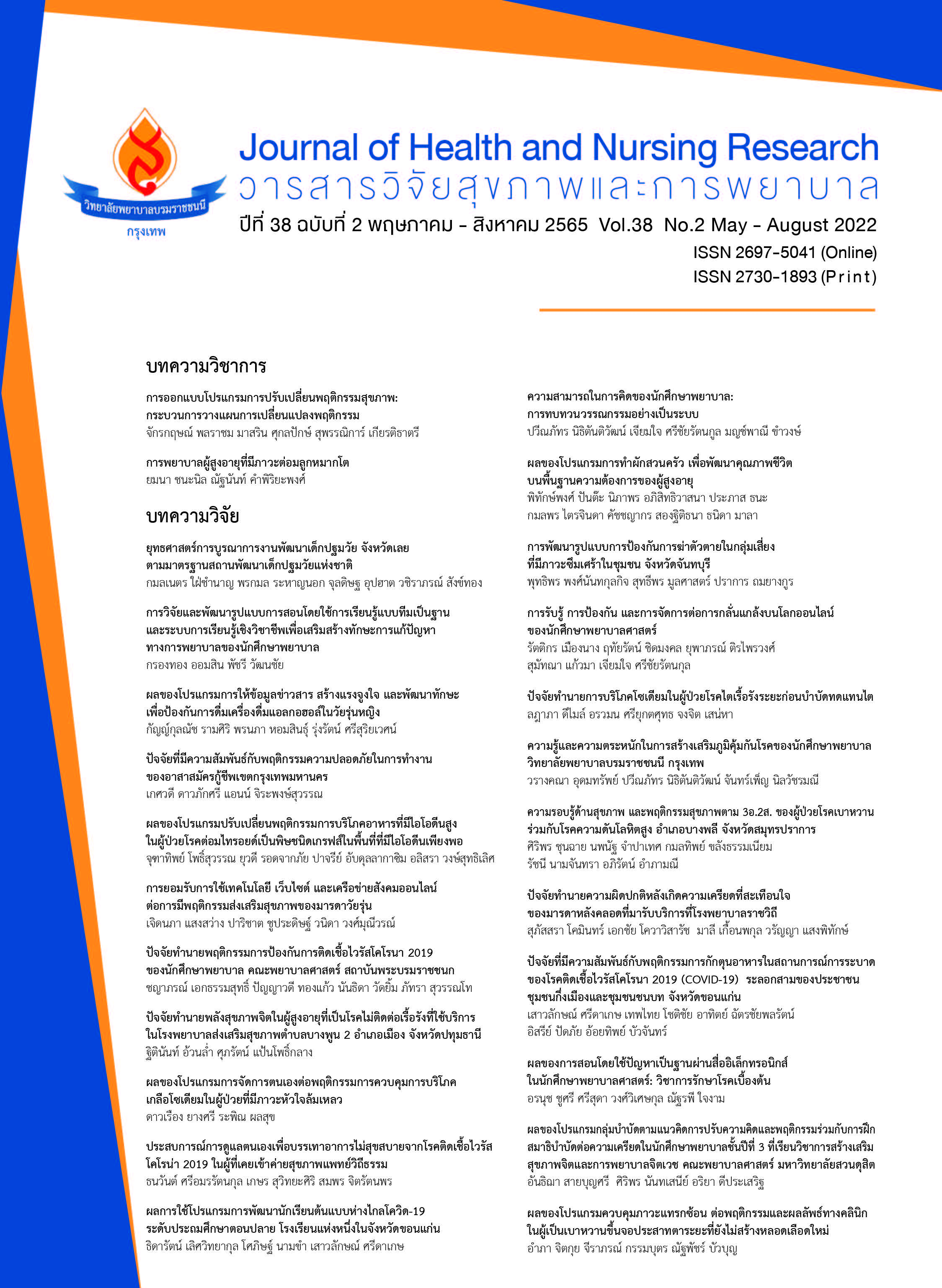ปัจจัยที่มีความสัมพันธ์กับพฤติกรรมการกักตุนอาหารในสถานการณ์การระบาด ของโรคติดเชื้อไวรัสโคโรนา 2019 (COVID-19) ระลอกสาม ของประชาชนชุมชนกึ่งเมืองและชุมชนชนบท จังหวัดขอนแก่น
คำสำคัญ:
โรคติดเชื้อไวรัสโคโรนา 2019 , พฤติกรรมการกักตุนอาหารบทคัดย่อ
บทนำ: โรค COVID-19 เกิดการระบาดระลอกสาม ส่งผลต่อการดำเนินชีวิตโดยเฉพาะพฤติกรรมการกักตุนอาหารของประชาชนในสถานการณ์ดังกล่าว
วัตถุประสงค์การวิจัย: เพื่อศึกษาพฤติกรรมการกักตุนอาหารและศึกษาปัจจัยที่มีความสัมพันธ์กับพฤติกรรมการกักตุนอาหารในสถานการณ์การระบาดของโรค COVID-19 ระลอกสาม
ระเบียบวิธีวิจัย: การวิจัยแบบภาคตัดขวาง กลุ่มตัวอย่างเป็นประชาชนตัวแทนครัวเรือน ๆ ละ 1 คนที่มีอายุ 18-60 ปีในชุมชนกึ่งเมืองและชุมชนชนบท จังหวัดขอนแก่น สุ่มตัวอย่างแบบหลายขั้นตอนและสุ่มแบบง่ายโดยการจับสลาก ได้กลุ่มตัวอย่าง 292 คน เก็บรวบรวมข้อมูลโดยใช้แบบสอบถาม วิเคราะห์ข้อมูลด้วยสถิติพรรณนา สถิติ Chi-square test และ Multiple logistic regression ที่ช่วงความเชื่อมั่น 95%
ผลการวิจัย: พบว่ากลุ่มตัวอย่างมีพฤติกรรมการกักตุนอาหาร ร้อยละ 36.30 โดยชุมชนกึ่งเมืองมีโอกาสในการเกิดพฤติกรรมการกักตุนอาหารเป็น 3.92 เท่าของชุมชนชนบท (OR = 3.92, 95%CI of OR = 2.35 ถึง 6.54, p< .001) และปัจจัยที่มีความสัมพันธ์กับพฤติกรรมการกักตุนอาหารในสถานการณ์การระบาดของ COVID-19 ระลอกสาม ได้แก่ ปัจจัยอายุมากกว่า 45 ปี (ORadj 2.85, p<.001, 95%CI [1.48, 3.31]) ปัจจัยรายได้ครอบครัวต่อเดือนมากกว่า 15,000 บาท (ORadj 2.14, p<.001, 95%CI [1.03, 3.26]) และปัจจัยจำนวนสมาชิกในครอบครัวมากกว่า 3 คน (ORadj 2.12, p=0.010, 95%CI [1.02, 3.22]) เมื่อเปรียบเทียบกับปัจจัยจำนวนสมาชิกในครอบครัวไม่เกิน 3 คน
สรุปผล: ควรมีการเตรียมความพร้อมและเผยแพร่ความรู้ให้กับประชาชนเกี่ยวกับการเลือกซื้ออาหารที่มีคุณภาพ
Downloads
เอกสารอ้างอิง
World Health Organization. 2019 Novel Coronavirus (2019-nCoV): Strategic preparedness and response plan [Internet]. 2019 [Cited 2020 Mar 13]. Available from: https://www.who.int/docs/default-source/coronavirus/srp-04022020.pdf?sfvrsn=7ff55ec0_4&download=true.
World Health Organization. Surveillance case definitions for human infection with novel coronavirus (nCoV): interim guidance v1 [Internet]. 2020 [Cited 2020 Apr 16]. Available from: https://apps.who.int/iris/handle/10665/330376.
World Health Organization. Coronavirus disease (COVID-2019), situation reports [Internet]. 2020 [Cited 2020 Apr 16]. Available from: https://www.who.int/emergencies/diseases/novel-coronavirus-2019/ situation-reports/.
Ministry of Public Health. The situation of Corona virus in Thailand [Internet]. 2020 [Cited 2020 Apr 16]. Available from: https://ddc.moph.go.th/viralpneumonia/ind_world.php. (in Thai)
Khon Kaen Provincial Health Office. The situation of Coronavirus 2019 in Khon Kaen [Internet]. 2021 [Cited 2021 Apr 1]. Available from: http://covid19.kkpho.go.th/situation/. (in Thai)
Suan Dusit University. Suan Dusit Poll: The standard stand up for the people. Concerns about the COVID-19 vaccine among Thai people [Internet]. 2021 [Cited 2021 Apr 1]. Available from: https://thestandard.co/thailand-coronavirus-vaccine-anxiety/
Galanakis CM. The food systems in the era of the coronavirus (COVID-19) pandemic crisis. Foods. (2020) 9:543, doi: 10.3390/foods9040523.
Guarascio F. Coronavirus Border Curbs Disrupt EU Food Supplies: Industry [Internet]. 2021 [Cited 2021 Jan 21]. Available from: https://www.reuters.com/article/us-health-coronavirus-eu-food/coronavirus-border-curbs-disrupt-eu-food-supplies-industry-idUKKBN2161OQ.
Janz NK., Becker MH. The health belief model: A decade later. Health Education Quarterly. 1968;11(1):1-47.
Faul F. G*Power version 3.1.9.2 [Internet]. 2018 [Cited 2018 Mar 6]. Available from: https://www.poycho.uni-duessldorf.de/abteilungen/aap/gpower3/.
Wongrata C. Techniques for using statistics for research. 12th ed. Nontaburi: Thainiramitkij Infographic; 2010. (in Thai).
Nam VH, Luu HN, Anh NTT, Nguyen TA, Doan HQ. Household stockpiling in response to the Covid-19 pandemic: Empirical evidence from Vietnam [Internet]. 2021 [Cited 2021 Apr 1]. Available from: https://www.tandfonline.com/doi/abs/10.1080/07360932.2021.1904431
Lehberger M, Kleih AK & Sparke K. Panic buying in times of coronavirus (COVID-19): Extending the theory of planned behavior to understand the stockpiling of nonperishable food in Germany [Internet]. 2021 [Cited 2021 Apr 1]. Available from: https://doi.org/10.1016/j.appet.2021.105118
Wang E, An N, Gao Z, Kiprop E & Geng X. Consumer food stockpiling behavior and willingness to pay for food reserves in COVID-19. Food Security. 2020;12:739-47.
Guney OI, Sangun L. How COVID-19 affects individuals' food consumption behaviour: a consumer survey on attitudes and habits in Turkey. British Food Journal [Internet]. 2021 [Cited 2021 Apr 1]. Available from: https://www.emerald.com/insight/content/doi/10.1108/BFJ-10-2020-0949/full/html
Jansseb M, Chang BP, Hristov H, Pravst I, Profeta A, Millard J. Changes in food consumption during the COVID-19 pandemic: Analysis of consumer survey data from the first lockdown period in Denmark, Germany, and Slovenia. Frontiers in Nutrition 2021;8(1-20).
Hassen TB, Bilali HE & Allahyari MS. Sustainability 2020 [Internet]. 2021 [Cited 2021 Apr 1]. Available from: https://www.mdpi.com/journal/sustainability
Biraglia A, Brizi A. "Do I Have Enough Food?" How need for cognitive closure and gender impact stockpiling and food waste during the COVID-19 pandemic: A cross-national study in India and the United States of America [Internet]. 2021 [Cited 2021 Apr 1]. Available from: https://eprints.whiterose.ac.uk/165837/
Natsit P, Junprasert S, Krungkraipetch. Factors influencing fruit and vegetable consumption among grade 6 primary school students in Bangkok metropolitan. Journal of Health and Nursing Research 2019;35(2):44-56. (in Thai).
Srikan P, Thatan S, Srichanpan W, Pinsakul C. Relationship between knowledge, self-care agency, sodium reduction behavior and urinary sodium level of students and employees of the Boromarajonnani College of Nursing Phayao. Journal of Health and Nursing Research 2020;34(3):21-33. (in Thai).
Coleman P, Dhaif F, Oyebode O. Food shortages, stockpiling and panic buying ahead of Brexit as reported by the British media: A mixed methods content analysis [Internet]. 2021 [Cited 2021 Apr 1]. Available from: https://osf.io/preprints/socarxiv/vfqhn/
ดาวน์โหลด
เผยแพร่แล้ว
รูปแบบการอ้างอิง
ฉบับ
ประเภทบทความ
สัญญาอนุญาต
ลิขสิทธิ์ (c) 2022 วารสารวิจัยสุขภาพและการพยาบาล (วารสารวิทยาลัยพยาบาลบรมราชชนนี กรุงเทพ)

อนุญาตภายใต้เงื่อนไข Creative Commons Attribution-NonCommercial 4.0 International License.
บทความที่ได้รับการตีพิมพ์ เป็นลิขสิทธิ์ของวารสารวิจัยสุขภาพและการพยาบาล (วิทยาลัยพยาบาลบรมราชชนนี กรุงเทพ) ไม่สามารถนำไปตีพิมพ์ซ้ำในวารสารฉบับอื่น


















